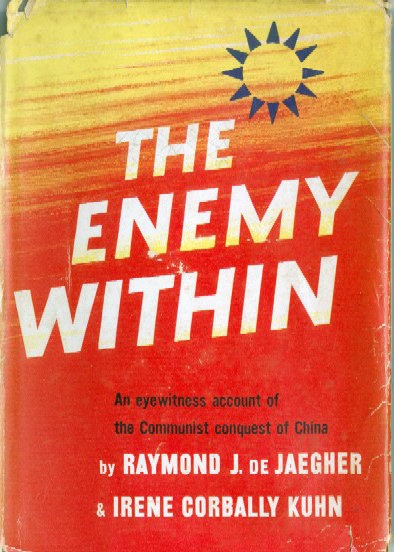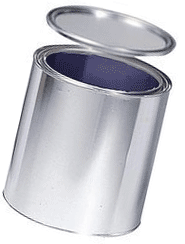
- by Raymond deJaegher
Chapter XVIII
[excerpts]
 [...]
[...]
We all did what we could in that close communal living to keep things on an even keel. We were cut off from the outside world completely at first and we had no means of knowing how the war was going, whether we were winning or losing. We were allowed to write letters, and the Japanese collected them regularly to censor and mail.
They imposed restrictions on this correspondence, however, limiting the number of letters any one person could write in a month and insisting that the letters contain no more than twenty-five words — what they called “Red Cross” letters written on paper supplied by the International Red Cross and sent through them to the addressees. This was highly, unsatisfactory, and when we learned that even these skeleton epistles were held by the Japanese for a year before they bothered to send them on, the indignation of the camp was intense.
A few of us talked together about a way to circumvent these restrictions, and I devised a scheme which I was sure would work. Through our Chinese agents on the outside, our own private black market, I purchased several Chinese-style envelopes and addressed them in Chinese characters, of course, to loyal Chinese friends of certain prisoners in camp who joined me in the plot. Some of these old China hands had many good, close friends among other long-time residents in Chinese cities who were citizens of Germany and Italy and, as such, not subject to imprisonment by the Japanese.
However, while we now had certain fixed, sure addresses of persons outside to whom direct letters could be sent, or messages for others enclosed for relaying from the first point, we had to make sure mail from a Japanese concentration camp could pass through the Japanese-controlled Chinese post office once it was safely over the prison wall and in the post office. The name and address of the writer of every letter had to appear on the envelope. This stumped me for a while until, fortunately, I found in the hospital files, which were intact and had been overlooked by the Japanese, a list of former patients with local addresses. This solved the problem. I used these names and addresses on the Chinese envelopes, changing them regularly, of course, and keeping careful secret records of my own.
When the outgoing letters were written and scaled inside the properly addressed envelopes, I weighed the package with a brick and threw it over the wall with money to cover the transaction to the Chinese waiting to receive it. He stamped the letters and routed them to other trusted agents, who posted them at different places. We never used the local Weihsien post office for this business, and our letters always arrived safely at their distant destinations, Peiping, Tientsin, and Tsingtao, even Shanghai. We began presently to get answers to our letters and news of a sort.
Our activities with Chinese outside grew so varied and numerous that too many agents were coming over the wall all the time, and finally the Japanese strung an electric wire around the ditch to prevent this illegal traffic. We soon overcame this temporary frustration by using the handful of Chinese coolies who came inside every morning.
These were the only Chinese workers allowed in the camp. They were lavatory coolies who came in to clean out the cesspools and carry the pails outside the camp. The Japanese considered this dirty work beneath them, one that was fit only for the Chinese.
 I asked for the job of “sanitary patrol captain”, whose duties included taking care of all the toilets in camp, in order to be able to make contact with the lavatory coolies. These humble men were searched coming into camp, but when they went out, with their filthy buckets swinging on poles from their shoulders, the Japanese gave them a wide berth and never bothered to search them. I had observed this for a long time, and now all I did was give the packets of letters to the coolies, who stuffed them inside their baggy blue cotton pants as they went out.
I asked for the job of “sanitary patrol captain”, whose duties included taking care of all the toilets in camp, in order to be able to make contact with the lavatory coolies. These humble men were searched coming into camp, but when they went out, with their filthy buckets swinging on poles from their shoulders, the Japanese gave them a wide berth and never bothered to search them. I had observed this for a long time, and now all I did was give the packets of letters to the coolies, who stuffed them inside their baggy blue cotton pants as they went out.
But after a while, the Japanese became suspicions of them and searched them daily as they came and went. I had to think up something else. I soon did. I rolled the letters up tight, put them in a tin box, filled the box with sand, and sealed it. By this time we had a little engineering shop going in camp for minor repairs, and it was easy to seal the tin box all around. Once that was done, I dropped the tin box into the pail of human refuse, and the coolie took it out.
This went on for a long time, and then the Japanese became suspicions again, and before a coolie was passed through the gates a Japanese soldier stopped him and at arm’s length poked around in the mess with a long stick. It was really funny to match those Japanese soldiers, with white gauze masks covering their faces, as they went about this disagreeable duty. It was funny, but it annoyed me, too, because I realized I then had to find still another way of getting the mail out.
Many times after I came to New York and had business at the main post office on Eighth Avenue there I read the carved lettering over the doors, the motto that has set the code for the faithful and trustworthy men in the American postal service. That’s the motto that all Americans know, I’m sure -”Neither snow, nor rain, nor heat nor gloom of night stays these couriers from the swift completion of their appointed rounds.” Every time I climbed the steps and read that motto, I thought of the way we got mail through from the Weihsien concentration camp for more than two years without once getting caught. The Japs heard something that made them suspicions, but we were always just one jump ahead of them. We were lucky, but I was also careful never to describe my methods or discuss them with anybody. Only my fellow prisoner in the engineering shop who sealed the tin boxes with his soldering iron knew what he was doing it for — and even he didn’t know about my other methods.
In the end, however, the simplest trick of all worked perfectly, and I used it all the time right up until V-J Day.
Every Saturday the Weihsien post office sent a postman to deliver mail for the camp. In the beginning he had several bags, but as time went on and restrictions were piled on restrictions, the bags grew fewer and fewer. One postman came once a week with one small bag, which he carried on his bicycle. In that bag were newspapers and mail for the whole camp.
The postman was always searched thoroughly as he alighted at the gate, and a Japanese guard accompanied him to the commandant’s office. The postman pushed his bike along, and the guard walked beside him. At the office the postman lifted the mailbag off his bike and, with the guard tagging along, went inside to deliver it.
I noticed that the Japanese were most suspicions of the Chinese postman but never of his bicycle and that it was left beside the door unguarded. I noticed, too, that there was a small canvas bag which hung from the frame of the bike, between the saddle and the handlebars. This was the bag in which the postman undoubtedly carried his local mail, I reasoned, and into which, on his return from the commandant’s office, he put the rolled-up empty bag which had held the camp letters and papers.
For a few Saturdays, I watched his coming and going and observed the fixed pattern of the routine. One Saturday I strolled casually by and dropped a few letters into the empty bag while the postman was in the commandant’s office with the guard. Then I walked away and stood off to one side and waited to see what would happen.
The postman came out with the guard. He was rolling up the, empty bag. He leaned over to put it into the small canvas bag on the frame of his bike and he saw what I wanted him to see the letters I had dropped in and, on top of them, an American dollar bill.
He looked once and looked again, and then half straightened up and looked around. I moved quickly and put myself directly in his line of vision and made the Chinese gesture of thanks to him, my two hands clasped together and raised in front of my face. He understood at once and jammed the empty bag in on top and went off with the guard.
I repeated this performance every week then for the rest of the time we were there, eighteen months or so, I should judge. It cost us only a dollar a week, a small expense everyone was glad to share for this invaluable service. All the letters got through even though we had many different postmen. The first passed the word along to his successor and they all let nothing interfere with the swift completion of their appointed rounds, neither snow, nor rain, nor heat, nor gloom of night, nor Japanese.
It was only natural, since we had had so much success getting our mail out, that we should have thought of getting ourselves, out.
One of our numbers was a brave and ingenious Englishman named Laurie Tipton, who had been connected with the British American Tobacco Company before the war. Tipton knew agents of the company in the city of Weihsien, but they were afraid of the Japanese and were of no help to us. Then through one of the American Franciscan brothers in camp I made contact with an Irish priest in Chow T’sun. This village was a hundred miles away from us, but soon we were in frequent touch with him and, through him, with much of what was going on, because he had a radio and collected all the news that came over it, wrote it out, and assembled it in readable form. He gave this to his Chinese servant, who came by railway to Weihsien, walked to the camp, and at an appointed hour, flung the packet over the wall.
We passed the news around, and it was very welcome indeed because up to then the only China news we had was from an occasional issue of the Peiping Chronicle, which, of course, was all Japanese propaganda.
Tipton and I agreed to work together about this time to establish sources outside and try to arrange for the two of us to get away.
Little by little we accumulated maps, information about the country, location of enemy forces, Communist forces, all that. We also learned to our great joy that there were Nationalist guerrillas nearby, and through my faithful lavatory coolies I made contact with them. This took a lot of time because among the coolies, who were changed every month, there were Nationalists and Communists as well as Chinese who were pro-Japanese.


[further reading] ...
http://www.weihsien-paintings.org/rdjaegher/text/R_deJaegher(WEB).pdf
#








